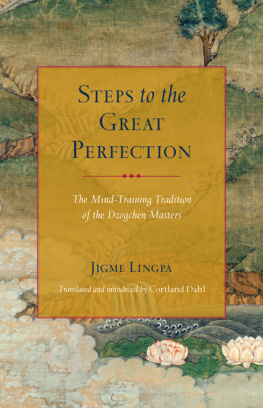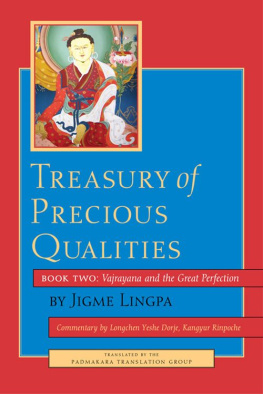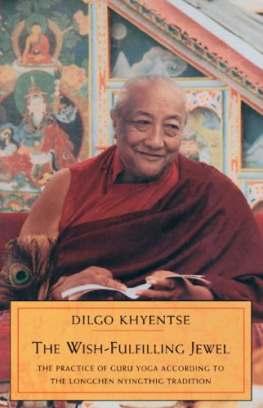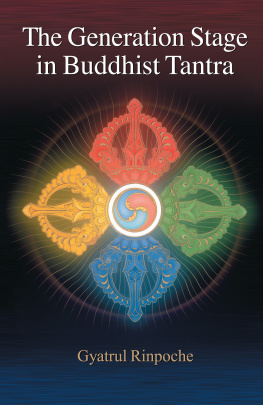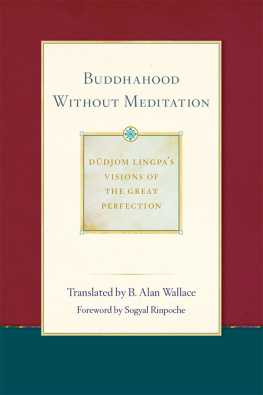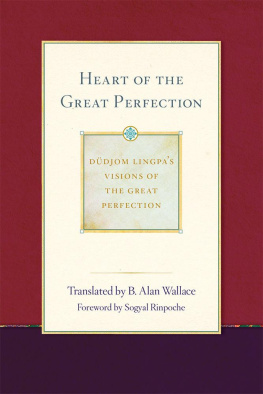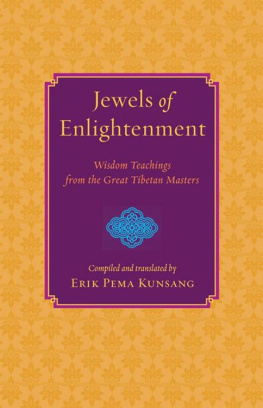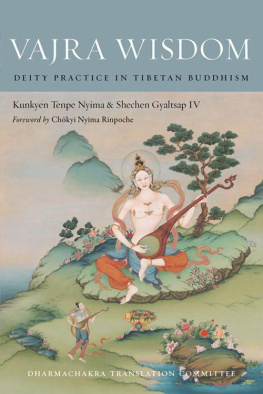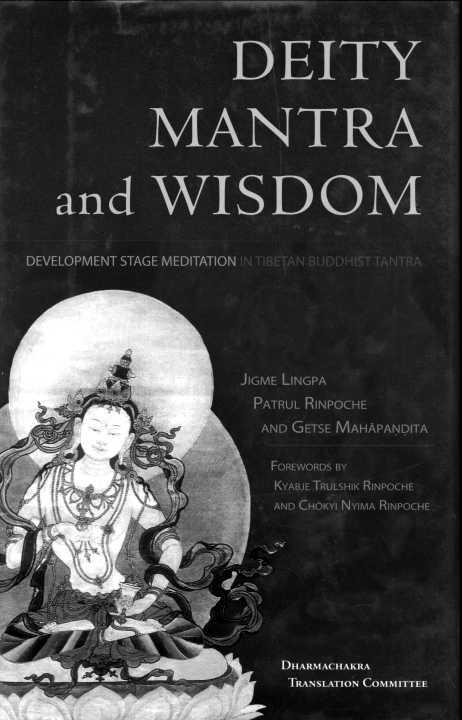
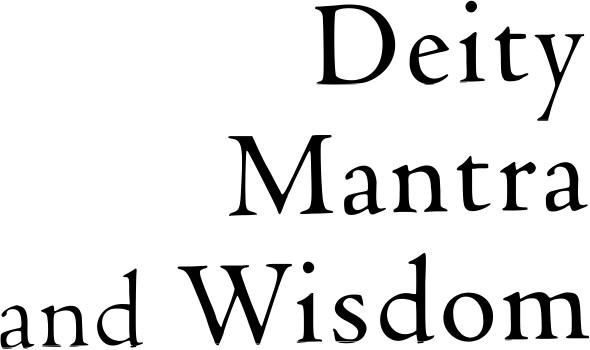
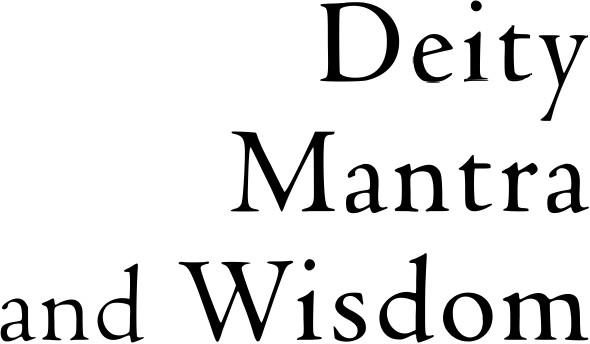
DEVELOPMENT STAGE MEDITATION IN TIBETAN BUDDHIST TANTRA

by JIGME LINGPA, PATRUL RINPOCHE, AND GETSE MAHAPANDITATranslated by the DHARMACHAK1 \ TRANSLATION COMMITTEE

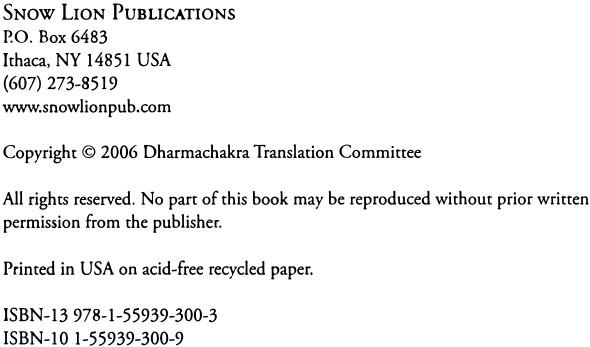
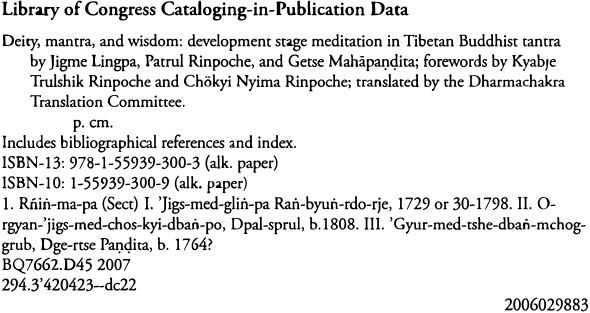
TABLE OF CONTENTS
TEXTS ONE & Two .JIGME LINGPA & PATRUL CHOKYI WANGPO
TEXT THREE ,PATRUL CHOKYI WANGPO
TEXT FOUR GETSE MAHAPANDITA TSEWANG CHOKDRUB
"Regard all appearances, sounds, and thoughts As the play of deity, mantra, and wisdom."-Getse Mahapandita Tsewang Chokdrub

FOREWORD
by Trulshik Rinpoche
As our compassionate teacher turned the wheel of Dharma in this realm he gave eighty-four thousand teachings. All of these were given to tame the afflictions of those in need of guidance. When condensed, these teachings can all be included in two vehicles, those of cause and fruition.
The texts that concern us here pertain to the Mantra Vehicle, in which the fruition is taken as the path. Here we find the omniscient Jigme Lingpa's Instructions on the Development Stage and Deity Yoga, Dza Patrul Urgyen Jigme Chowang's two compositions Four Stakes That Bind the Life-Force and Difficult Points in the Development Stage, as well as Getse Mahapandita Tsewang Chokdrub's Husks of Unity: A Clarification of the Development Stage Rituals. These four texts have now been translated into English by Andreas Doctor and Cortland Dahl, two devoted, committed, and knowledgeable students of the supreme refuge, Chokyi Nyima Rinpoche. In this I rejoice and offer my thanks.
The path of Secret Mantra is one of both great profit and danger. Therefore, anyone who practices these texts should receive the empowerments, reading transmissions, and instructions from an authentic spiritual teacher, doing so in the correct manner. Once the essential practice has been perfected, it is certain that both the dharmakaya and rupakaya will be attained. For this reason, I request that these points be kept in mind.
This was written by the Buddhist monk Ngawang Chokyi Lodro on the fifteenth day of the second month of the Fire Dog Year, zoo6.

FOREWORD
by Chokyi Nyima Rinpoche
Our Teacher, the perfectly enlightened transcendent conqueror, turned a limitless number of Dharma wheels out of his boundless compassioneach of these matching the mind-set of those, including ourselves, who need his guidance. Two approaches can be found in these teachings. The first comprises the Common Vehicle, in which causes are taken as the path, while the second is the Vajra Vehicle of Secret Mantra, where the kayas and wisdoms of the fruition are taken as the path. The latter of these two is based on the intent of the ocean of tantras.
This latter approach can also be condensed into the practices and key instructions associated with the stages of development and completion, which relate to the four empowerments. In this system, the vase empowerment purifies and ripens the body and the channels. The secret empowerment purifies and ripens speech and the energies. The wisdom empowerment purifies and ripens the mind and the essences. Finally, the precious word empowerment purifies the karma of the all-ground and the cognitive obscuration. Since this process purifies the four obscurations, completes the four paths, and actualizes the four kayas, it constitutes a uniquely swift path. This approach, in turn, is embodied in the skillful means of the development stage and the wisdom of the completion stage. On this path, there are three notions one should never lose sight of. that appearances are the deity, sounds are mantra, and thoughts are wisdom. These points are of crucial importance.
On this topic, a wealth of intricate details, key instructions, and blessings are contained in Jigme Lingpa's Instructions on the Development Stage, Patrul Urgyen Jigme Chokyi Wangpo's Difficult Points in the Development Stage and Four Stakes That Bind the Life-Force, as well as Getse Mahapandita Tsewang Chokdrub's Husks of Unity: A Clarification of the Development Stage Rituals. Under the auspices of the Dharmachakra Translation Committee, these four texts have now been faithfully and diligently rendered into English by two devoted, committed, and knowledgeable students of mine, Andreas Doctor and Cortland Dahl. This is a cause for strewing flowers of joy and happiness.
As these instruction manuals explain the profound key points of the Vajra Vehicle of Secret Mantra, to make proper use of them it is crucial first to seek out an authentic vajra master. Such an individual will have liberated his or her own mind through realization and be capable of liberating the minds of others through compassion. One must then receive the empowerments that mature the student, the guidance and key instructions that bring liberation, and the supportive reading transmissions from that master. Finally, the teachings should be practiced in a genuine manner.
If you practice in this way, there is no doubt that you will come to actualize the state of the four kayas and five wisdoms and gain mastery over the two rupakayas that compassionately benefit others. In this capacity, you will become a great guide capable of leading limitless sentient beings. It is, therefore, of the utmost importance that everyone takes this as the very core of their practice. Since this is already well known, I request that it be applied accordingly.
This was written by Chokyi Nyima, who has been given the title of Tulku, on the fifteenth day of the eleventh month in the Wood Bird Year of the seventeenth cycle, the year 213 2 of the Tibetan kings.
INTRODUCTION
The practices of the Vajra Vehicle are based on the profound content of the Buddhist tantras. In Tibet, these sacred texts were studied and practiced in two major traditions, one tracing itself to the dynastic period of the eighth and ninth centuries and another stemming from the later translation efforts that took place between the eleventh and thirteenth centuries. Due to this temporal distinction, these two traditions became known, respectively, as the Nyingma (rNying ma, Ancient) and Sarma (gSar ma, New) Schools. Although these two traditions do, at times, vary in their view on the finer details of ritual performance and textual interpretation, both are alike in summarizing the practice of Tantra under the two main headings of "development stage" (bskyed rim) and "completion stage" (rdzogs rim). For well over a thousand years, it was these two paths ofTantra that led innumerable beings to spiritual fulfillment and awakening, both in India and Tibet.
Next page

